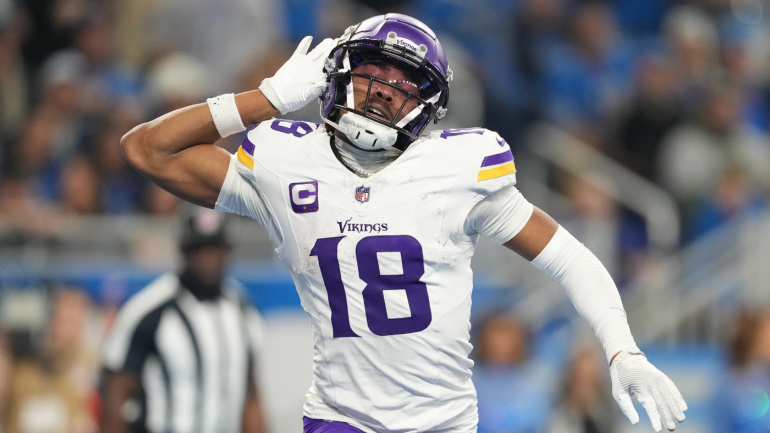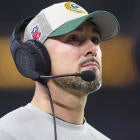
Justin Jefferson just reset the wide receiver market and replaced San Francisco 49ers edge rusher Nick Bosa as the NFL's highest-paid non-quarterback in the process. The Minnesota Vikings signed Jefferson to a four-year, $140 million contract extension, averaging $35 million per year.
Bosa had become the league's highest-paid non-quarterback last September right before the 2023 season started when he signed a five-year, $170 million extension, averaging $34 million per year, with non-quarterback records of $122.5 million in overall guarantees and $88 million fully guaranteed at signing. The standard at wide receiver was A.J. Brown's recent three-year, $96 million extension with the Philadelphia Eagles, averaging $32 million per year. Brown set a wide receiver record with $84 million in guarantees. The $51 million fully guaranteed at signing was the second most ever for a wide receiver.
Jefferson's deal establishes new wide receiver records for overall guarantees and the amount fully guaranteed at signing, respectively, with $110 million and $88.743 million. The $88.743 million is also the most ever fully guaranteed at signing for a non-quarterback.
Jefferson's extension should be the catalyst for the Dallas Cowboys to sign CeeDee Lamb long term. Cowboys owner Jerry Jones said he wanted to see some more cards played first at the wide receiver position several weeks ago. There isn't a bigger card for wide receivers than Jefferson getting a deal done.
Lamb, who is scheduled to make $17.991 million in 2024, is not attending the Cowboys' mandatory minicamp this week (June 4-6) as he seeks a new contract. He is subject to a $101,716 fine if he misses all three days of the minicamp.
Lamb likely wants to be paid more than Jefferson's $35 million per year after having the greatest receiving season in Cowboys history with 135 catches for 1,749 yards and 12 touchdowns in 2023. His 135 receptions not only led the league but were the sixth most ever in an NFL season. He was second and third in the NFL, respectively, in receiving yards and touchdown catches.
Lamb can bolster his case by focusing on the last two seasons when he became Dallas' clear-cut primary receiving threat once Amari Cooper was traded to the Cleveland Browns. Since the start of the 2022 regular season, Lamb has a league-leading 242 receptions. He ranks second with 3,108 yards receiving and 21 touchdown catches.
The Cowboys may find paying Lamb more than Jefferson problematic. Lamb had a better 2023 than Jefferson, who missed seven games with a right hamstring injury, but lagged behind his fellow 2020 first-round pick in receiving yards per game. Jefferson averaged 106.4 yards per game to rank second in the NFL. Lamb was third at 102.9 yards per game.
Jefferson is the most productive wide receiver ever through four NFL seasons. He has 392 receptions for an NFL-record 5,899 yards and 30 touchdowns in 60 games. Lamb has 395 receptions for 5,145 yards and 32 touchdowns in 66 games.
Jefferson was named 2022's NFL Offensive Player of the Year after catching 128 passes for 1,809 yards receiving. His 98.3 yards receiving per game are easily the most in NFL history. Hall of Famer Calvin Johnson, whose nine NFL seasons were with the Detroit Lions, is a distant second at 86.1 yards per game.
The Cowboys probably don't want to set a precedent by making Lamb the NFL's highest-paid non-quarterback. It would ensure that edge rusher Micah Parsons will top the non-quarterback salary hierarchy when he signs a contract extension, which will likely happen anyway. The 2021 NFL Defensive Rookie of the Year became eligible for a new deal after the 2023 regular season ended on Jan. 7. Parsons is under contract for two more seasons because the Cowboys exercised a fully guaranteed $21.324 million fifth-year option with him for 2025.
Lamb's stellar 2023 season in which he earned First Team All-Pro honors as well as his body of work throughout his four-year NFL career, particularly the last two years, should give him enough ammunition to surpass Brown's $32 million per year. The midpoint of Brown and Jefferson's extensions is $33.5 million per year.
Length of contract could be another sticking point in Lamb's negotiations. The Cowboys prefer to sign players to big-money extensions that are at least five years long. Getting a fifth new year from Lamb will likely require eclipsing Jefferson's contract guarantees especially if becoming the NFL's highest-paid non-quarterback is a deal-breaker for the Cowboys.
The continued insistence of a fifth new contract year was an impediment to a long-term deal with quarterback Dak Prescott. The Cowboys relenting led to Prescott signing a four-year contract in 2021 after playing the 2020 season under a franchise tag.
The trend this offseason is for high-end wide receiver contracts to be shorter. In addition to the Brown and Jefferson extensions, three other wide receivers have signed for at least $25 million per year as 2021 first-round picks Devonta Smith and Jaylen Waddle received respective three-year extensions from the Miami Dolphins and Eagles for $25 million and $28.25 million per year. Amon-Ra St. Brown briefly become the league's highest-paid wide receiver in late April when he signed a four-year, $120.01 million extension with the Lions, averaging $30,002,500 per year.
The gap between Jefferson's guarantees and the rest of the wide receiver market will still need to be bridged if Lamb falls short of Jefferson's $35 million per year on a four-year extension. Brown trails Jefferson in overall guarantees by $26 million. There's an even bigger spread between Jefferson and second place with fully guaranteed at signing. The four-year, $120 million extension, averaging $30 million per year, Tyreek Hill received in March 2022 as a part of his trade from the Kansas City Chiefs to the Dolphins had $52.535 million fully guaranteed at signing.
Cracking the top five ever for overall and full guarantees with non-quarterbacks would likely be a necessity. That would mean more than defensive tackle Chris Jones' $95 million in overall guarantees with the Chiefs and edge rusher Josh Allen's $76.5 million fully guaranteed at signing with the Jacksonville Jaguars.
Jones making Lamb play out his rookie contract and designating him as franchise player in 2025 would be a departure from history. The Cowboys haven't used a franchise tag on any of their first-round picks who were selected after the 2011 NFL Collective Bargaining Agreement created the rookie wage scale. The core players received contract extensions.
A Jefferson deal has been on Cincinnati Bengals wide receiver Ja'Marr Chase's radar for awhile. The 2021 NFL Offensive Rookie of the Year made it clear late last season that he intended to wait for Jefferson to reset the wide receiver market before signing a new deal. Chase's patience suggests he views Jefferson's $35 million per year as his salary floor.
Like Parsons, Chase became eligible for a contract extension when the 2023 regular season ended. He is also under contract through the 2025 thanks to the Bengals exercising his fully guaranteed fifth-year option for next year worth $21.816 million.
The biggest obstacle to a new deal, whether in 2024 or 2025, could be structure. Typically, the Bengals are in the dark ages when it comes to structuring contracts for veteran players. The only guaranteed money in Cincinnati veteran contracts is a signing bonus and/or a roster bonus payable within a few days of signing. The bigger deals contain an unsecured third or fifth day of the league year roster bonus in the second and third years. The roster bonuses are supposed to be substitutes for additional contract guarantees. The overall guarantees in Cincinnati contracts are less than comparable deals on other teams.
The only exception has been quarterback Joe Burrow, the league's highest-paid player at $55 million per year. He signed a five-year, $275 million extension with $219.01 million of salary guarantees in which $146.51 million was fully guaranteed at signing last September in the days leading up to the start of the 2023 regular season.
The Green Bay Packers structure contracts the same way as the Bengals. Future Hall of Fame quarterback Aaron Rodgers has been the lone exception. His 2013, 2018 and 2022 deals had traditional salary guarantees.
Cincinnati refusing to make another exception for Chase from this longstanding structural convention might require shattering the record for a signing bonus with a non-quarterback and outrageous cash flow to consummate a deal. The $50 million signing bonus Bosa received from the 49ers is the most ever for a non-quarterback. The signing bonus would be Chase's only true guaranteed money.
The Bengals have started doing more deals with an option bonus over the last couple of years. Option bonuses are prorated over the life of a contract (up to a maximum of five years), including the option years, beginning in the league year when the option is exercised. From a salary cap standpoint, the presumption is option years will be picked up. It remains to be seen whether a massive signing bonus and a significant option bonus in the second year could placate Chase structurally.
The Bengals run the risk of alienating Tee Higgins by extending Chase's contract before the regular-season opener. Higgins requested a trade after the Bengals placed a $21.816 million franchise tag on him in late February. Shortly thereafter, Bengals coach Zac Taylor said he planned on Higgins being in Cincinnati for the 2024 season.
Higgins, who hasn't signed his franchise tender, has been absent from Cincinnati's offseason workout program. Conventional wisdom suggests that 2024 is Higgins' last season in Cincinnati because teams rarely have two high-priced wide receivers long term. Higgins will likely target a contract in excess of $25 million per year should he hit the open market next year.
Niners wide receiver Brandon Aiyuk, who is scheduled to make a fully guaranteed $14.124 million in 2024 on a fifth-year option, has been frustrated with the lack of the new contract. He has skipped the offseason program and is a no-show for the mandatory minicamp, which subjects him to the same $101,716 fine as Lamb.
Aiyuk has been the subject of trade rumors because of a top-heavy 49ers payroll. There is plenty of speculation the 49ers will have to make a choice long term at wide receiver between Aiyuk and Deebo Samuel, who signed a three-year, $71.55 million extension (worth up to $73.5 million through incentives), averaging $23.85 million per year, at the beginning of training camp in 2022. The deal has $58.167 million in guarantees where $41 million was fully guaranteed at signing.
A Waddle-type contract at $28.25 million per year, which has $77 million in overall guarantees, is probably Aiyuk's salary floor since he has emerged as San Francisco's top receiving option for quarterback Brock Purdy. He has led the 49ers in targets in each of the last two seasons.
Aiyuk was named a Second Team All-Pro in 2023 after a career year of 75 receptions, 1,342 yards receiving and seven touchdown catches. His 17.9 yards per catch were second in the NFL. The seven 100-yard receiving games Aiyuk had in 2023 were the most for a 49er in a single season since Jerry Rice in 1995.
A $30 million-per-year contract isn't out of the question for Aiyuk after Jefferson's extension. Samuel's deal, adjusted for the 22.67% increase in the salary cap over the last two years, is just over $29.25 million per year.
Hill reportedly has been looking for a new contract since the 2023 season ended. Jefferson's deal only solidified Hill's thinking his contract should be addressed.
On paper, Hill's 2022 contract extension made him the NFL's first $30 million-per-year non-quarterback. Realistically, Hill has a three-year extension for $75 million because of $45 million in 2026, the final contract year.
In actuality, Hill was tied with Brown as the NFL's second-highest-paid wide receiver at $25 million when the 2024 league year began in mid-March. Five-year wide receivers, including Brown, have signed deals at or above Hill's $25 million-per-year mark over the last three months.
Hill has had his best two NFL seasons since being acquired by Miami. He is the league's most productive wide receiver over the last two years, averaging 119 receptions, nearly 1,755 yards receiving and 10 touchdown catches. The five-time First Team All-Pro was in position to break the single-season receiving yards record in 2023 until he was slowed by an ankle injury last December. He is the only player in NFL history to have more than 1,700 yards receiving in consecutive seasons.
Hill has three years left on his contract, just like Brown had when he got a three-year extension at $32 million per year to top the wide receiver market. He is scheduled to make to $19.765 million this year, $22.935 million in 2025 and $45 million in 2026 for a total of $87.7 million over the three years. The last of the guaranteed money in Hill's contract is this year.
Fortunately for the Dolphins, Hill's stated priority is ensuring that he ends his career in Miami instead of being the league's highest-paid wide receiver. For what it's worth, Hill has mentioned wanting to help the Dolphins as much as he can with a new deal. "Being greedy ain't going to help the team," Hill said.
The Dolphins giving Hill a three-year extension like the Eagles did with Brown is a riskier proposition. Hill is a little more than 3 years older than Brown. Although Hill turned 30 in March, he isn't showing signs of slowing down.





















